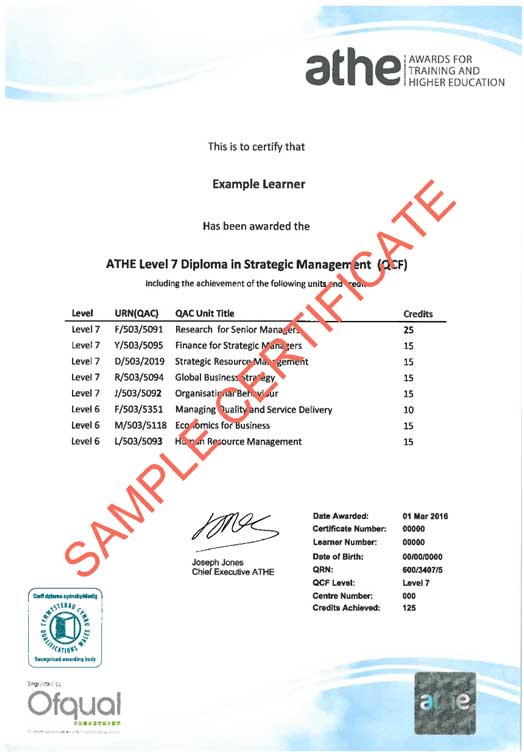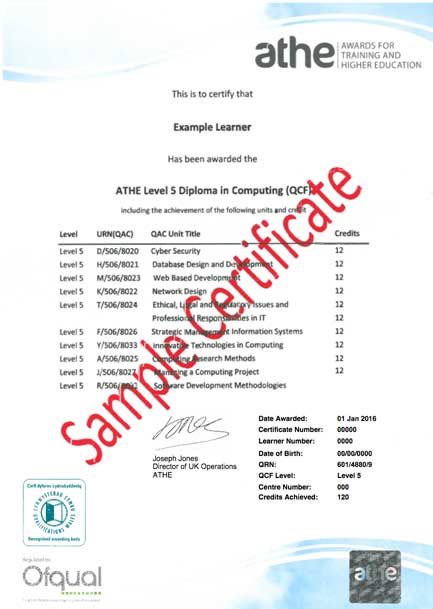Business Strategic Management, MBA ADVANCED ENTRY (LEVEL 7)
POSTGRADUATE DIPLOMA IN STRATEGIC MANAGEMENT
MBA ADVANCED ENTRY
LEVELS: 7 | CREDITS: 120 | £4999
Course Overview
The Level 7 Extended Diploma in Strategic Management is an MBA Advanced Entry course, which provides learners with 120 credits of the 180 credits required to achieve a complete MBA. The course itself is made up of 30 interactive modules and 8 written assignments, with approximately 40 guided learning hours per module. All modules have an additional 30-50 learning hours of optional materials that comprise of recommended exercises, recommended readings, Internet resources, and self-testing exercises. You will also have access to 24/7 support, tutoring, and a variety of other support mechanisms.
After receiving your Level 7 Diploma, you are eligible to apply for an MBA Top Up course, either online or on-campus at a range of UK Universities. The top-up portion will usually consist of the final 60 credits of either, a dissertation, or a dissertation and one module.
Eligibility
To enroll in the Level 7 program, you must be either
- a university graduate who is over 22 years old, or
- a non-university graduate over 24-year-old, and with at least five years of managerial experience.
Course Fees
The Level 7 Extended Diploma in Strategic Management is £4999.
Students can make payment using one of the following methods:
- Credit or Debit Card
- Bank Transfer
- Interest Free Monthly installments
- Paypal
- Western Union
The Course Fee includes
- All Course Material, including online modules and written assignments.
- Personal tutor support with 1-2-1 Skype sessions
- Dedicated student support
- Access to an online Social Learning forum
- Assignment marking and feedback
- Free CV Writing help on completion of the course
Level: 7 Module Listing
Qualities of effective leadership
Learners will explore the making and development of powerful leaders.
Developing interpersonal skills
Connecting and bonding with people within the commercial sectors is extremely important for good business. This module trains learners in skills to improve and enhance communication techniques to create strong bonds.
Motivating and influencing people
Inspiring people to create a unity of direction within a business.
Making decisions
Doing the right things in the right way at the right time. Learners will look at the process of making a good decision.
Creativity and problem solving
Do problems pose a threat or are they an opportunity to improve? Here, learners will figure out how to turn a problem into an advantage.
Studying and using management theories
There are many theories concerned with management and the various models developed from these theories. This module looks over these theories with real-life examples.
The external operating environment of business
Planning for influences on the business outside your control.
Culture and ethics
Culture and ethics involved in the business world today.
Governance and directorships
Structuring and controlling a business the professional way.
Analyzing the competition
What are my competitors doing, how are they doing it, why are they doing it? Reviewing and analyzing competitor actions to enhance managerial roles.
Marketing strategy
Creating an effective and successful market presence. Looking at the development of marketing strategies to create successful marketing campaigns.
High-performance sales
Learners will grasp the key elements of successful selling.
E-Marketing communication
Understanding and using effective electronic messages to the market.
Customers and their needs
Ensuring that your customers are recognized and valued.
Strategic human resource management
Human Resource Management must play a central role in the strategy of any organization. It is concerned with people as an asset to the business.
Recruiting and CPD
Getting the best people. Developing the best people. Keeping the best people.
Measuring and rewarding performance
Knowing and measuring how your people are performing.
Interpreting business accounts
Using and understanding the litmus tests of business health.
Tools of financial analysis
Resources, tools, and techniques to keep a finger on the pulse of the business.
Managing cash and working capital
Cash, cash flow and working capital. The lifeblood of business.
Exercises in quantitative techniques
How to use and understand key figures.
Impact of technology on business
Analyze and exploit the role of e-business within the business sector.
Innovation and R&D
Creating commercial advantage from innovation and research.
Implementing and managing quality systems
The right first time, right every time. The place of quality in business strategy.
Strategic planning tools
Resources, tools, and ideas to help create an effective business strategy.
Strategic and systems management
Options for strategic direction. Making the right choices for your business.
The business plan
Creating a plan that targets the stated aims and objectives of a business.
Developing high-performance teams
Cohesion and teamwork that enhance business performance.
Managing projects
Getting things done. Using the right tools to run projects.
Strategies for growth
This module explores the different ideas of growth and the various tools, measures and controls at a manager's disposal in planning for growth.
Level: 5 Module Listing
Innovative technologies in computing
This module looks at innovative trends and disruptive advances taking place and examines the new generation of skills and knowledge that will be required to work successfully in the sector.
Computing research methods
This module will explore the knowledge and skills required to research in this field and the qualitative and quantitative approaches required including the use of literature and design of research proposals.
Software development methodologies
This module looks at the role of systems engineering in the development of software and various models of data, software, and processes using modeling approaches.
Computing project planning
Creating and managing projects has changed over the years with the development of sophisticated IT software, this module focuses on how being a project manager in the ’80s differs from being a project manager in today’s world.
Strategic management information systems
This module is concerned with developing an understanding of the strategic role of MIS within the organization and how it impacts on the broader objectives and strategy of the business.
Ethical, legal and professional issues in IT
This module explores current issues in the IT sector and how these may impact on areas of security, confidentiality, privacy, and the law.
Network design and management
This module explores the principles of networks and network design and implementation and support of network systems.
Web-based development
This module will explore the design, deployment, and management of virtualization and explore its commercial and potential impact.
Cybersecurity
This module will enable an understanding of the importance of digital security to business, to understand industry standards of digital security and be able to recommend improvements in security.
Advanced databases
This module focuses on understanding database design and development includes advanced languages to analyze and query database data. Students will research database management and critically test and evaluate databases.
Level 7 Sample Certificate

Level 5 Sample Certificate

Written Assignments
The ATHE Level 7 Diploma in Strategic Management Course has 30 modules and 8 written assignments. On completion of the modules, students will be given access to the assignments. The assignments are approximately 5,000-8,000 words each. Students are provided support on the modules and assignments via the ‘Tutor’ section of the learning platform.
The Assignment unit titles for the level 7 course are:
- Strategic marketing
- Personal development for leadership and strategic management
- Organizational behavior
- Strategic planning
- Research for strategic development
- Finance for strategic managers
- Strategic human resource management
- Corporate communication strategies
More information about the Level 7 units can be found here www.athe.co.uk
Assessment
Assessment at Mortha Halls of Ivy is a very straightforward process:
- After you have completed an online module, you will have an online assessment to complete. This assessment contains 30 multiple-choice questions. You will have one hour to complete these questions which are answered in sets of five so you will have plenty of time to review and edit your answers. After an hour the test will automatically time out.
- After you have completed the test, your results will be displayed immediately. If you have passed, you will receive a Certificate of Completion. If you didn’t pass, you will receive a notification of a “refer’’ where you will be told how to retake a module assessment. You can complete these modules at your own pace, as there is no deadline to complete the course.
- When the online modules have been completed, you will then be able to take the final written assignments, provided by Mortha Halls of Ivy, that test your knowledge and understanding of the modules. After the successful completion of these eight assignments, you will receive your Diploma (from the Awarding Organization).
- You will then be eligible to apply for progression onto a Top-up course through a recognized UK university on-campus or by distance learning
University Top-Up
On completion of this course, students have the opportunity to complete an MBA program from a range of UK universities. The top-up program can be studied online or on campus. The MBA top-up comprises the final 60 credits which consist of either a dissertation or a dissertation and one module.
Students may top-up on campus or by distance learning.
Students can apply to any university offering the MBA top-up, the following universities run Top Up programs by DISTANCE LEARNING:
University of Gloucestershire
Postgraduate Top up to MBA Business Administration – £3750
University of Bolton
MBA Top-up – £3,500
Master of Business Administration Top Up
The University of Sunderland – On Campus
Postgraduate Top up to MBA – £5145
Anglia Ruskin University
MBA (Top-Up) – £3500
Buckinghamshire New University
MBA Top-up – £3,000
Northampton University
Top up to MBA– £3500
MA in Human Resource Management Top-up – £2200
MSc in Accounting and finance Top-up – £3800
Executive Master of Business Administration Top-Up MBA – £3510
Leeds Trinity University
MBA and MA International Business
University of West Scotland
MBA International Business – £3000
University of Portsmouth
MA Business Management
MA Business and Computer Studies
MA Professional Studies
MSc Professional Studies
University of Derby
Top up to MBA – (partial exemption)
Career Path
Upon successful completion of the Postgraduate Diploma in Strategic Management and the final year of an accredited postgraduate degree program, learners will have the skills to execute a professional managerial role in marketing, accounting, business consultancy, and more.
A business management diploma and MBA develops key cognitive skills such as critical thinking, analysis, evaluation, and writing while also establishing presentation and numeracy skills to enhance knowledge and experience. These skills are critical in helping you advance your career.